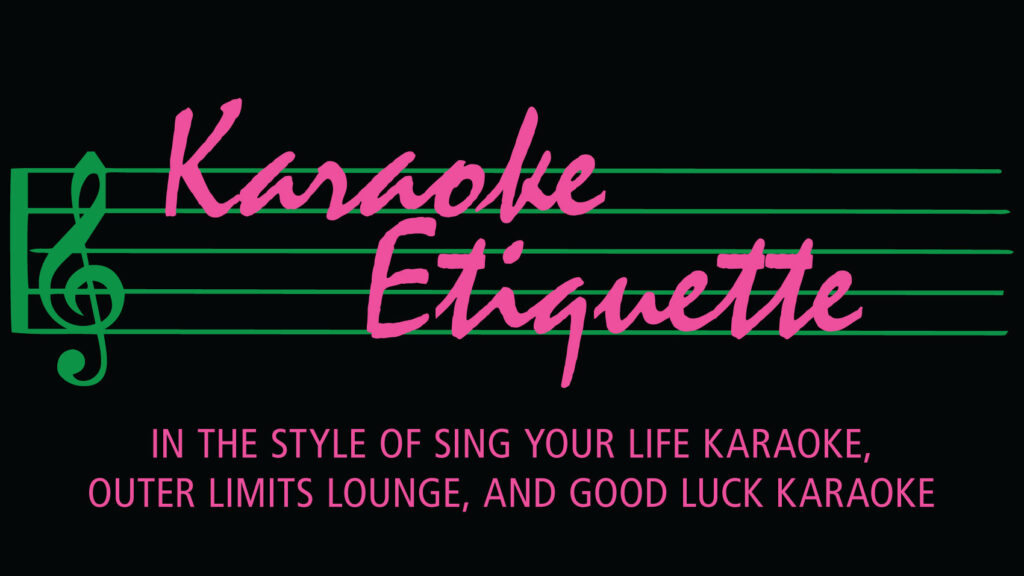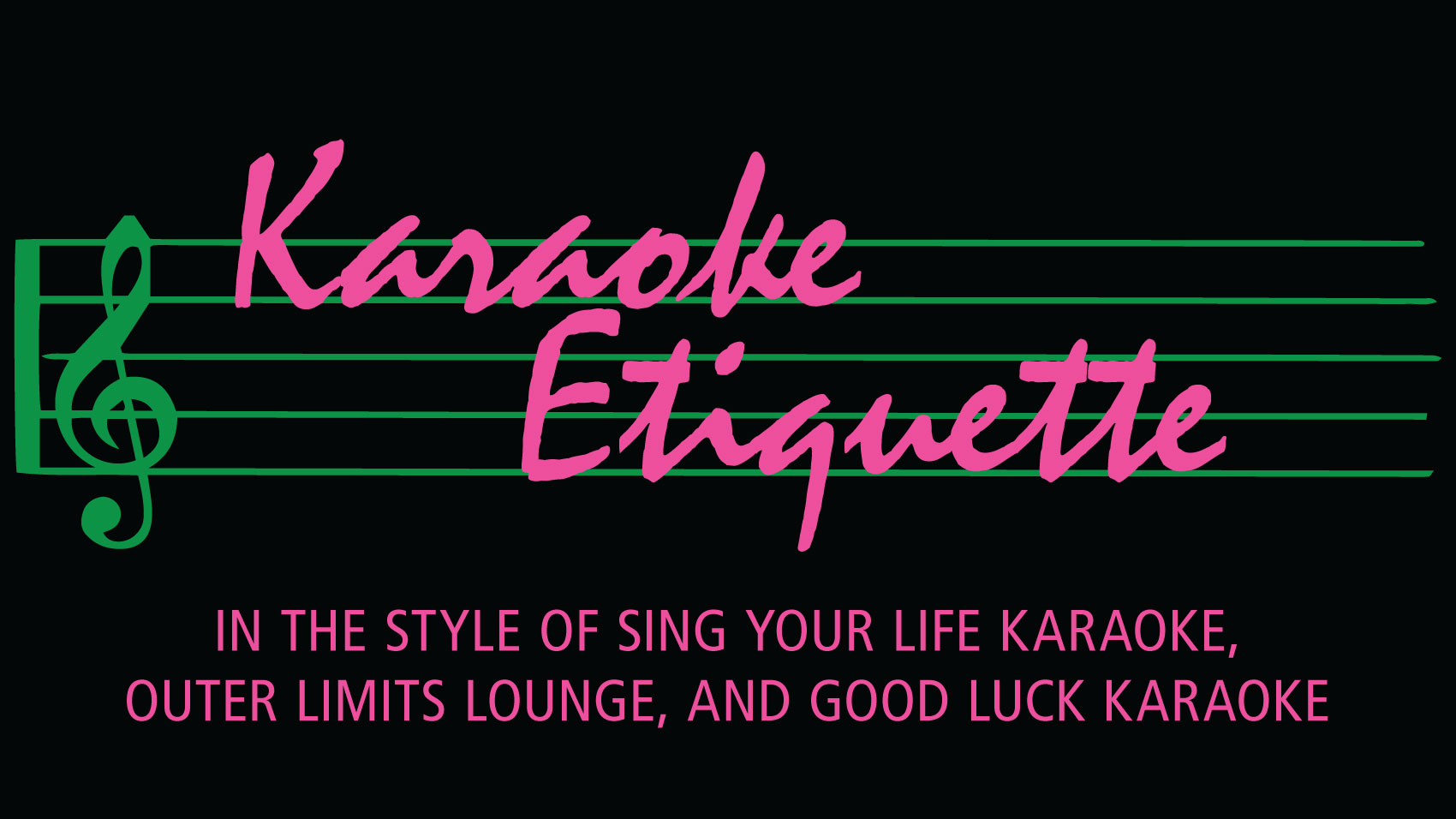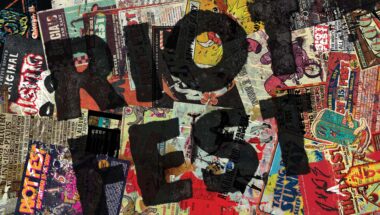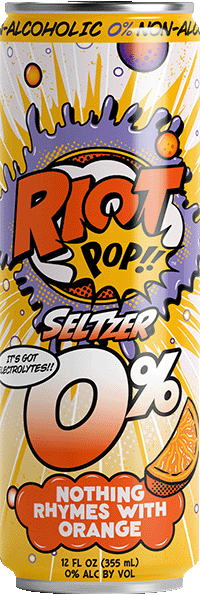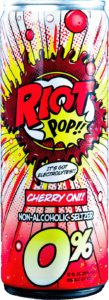The fourth week in April is National Karaoke Week, which, let’s be honest, beats the hell out of its immediate predecessor, Organize Your Files Week. If you’re a mean-spirited, fun-hating scold like myself, you’re less interested in having a good time caterwauling along with your friends and more focused on quietly judging the behavior and presentation of every singer that isn’t you.
However, the host is the true judge, jury, and executioner; hence, we spoke to three observant, respected KJs to get the lowdown on karaoke etiquette from their perspective. Philadelphia’s Sara Sherr is a veteran music journalist who runs at least five events per week under the Sing Your Life Karaoke banner, Detroit’s Shan Beaste is a vegan chef and musician who has popular weekly and monthly nights—the latter at Outer Limits Lounge, a bar owned by John Szymanski of the Hentchmen and Kelly Jean Caldwell of Wiccans, and Dallas’ Josh “Hammertimez” Robertson runs the inspired, weekly air-guitar-heavy-themed Good Luck Karaoke with cohort (and Riot Fest 2017 tattoo artist-in-residence) Oliver Peck.
So hand in your slip, and enjoy these on-key thoughts on mic-dropping, song-hoarding, and white boys belting out the N-word.
RIOT FEST: What are the five songs you hear most often, for better or worse?
SARA SHERR: These things can be in flux, depending on the crowd and the bar, but there are some pretty big staples, and I often get multiple requests for these songs: 4 Non Blondes, “What’s Up?”; Alanis Morissette, “You Oughta Know”; the Cranberries, “Zombie”; Amy Winehouse, “Valerie”; Vanessa Carlton, “A Thousand Miles.” (A lot of men are really into singing this right now for some reason.)
SHAN BEASTE: David Allan Coe, “You Never Even Called Me by My Name”; Alanis Morissette, “You Oughta Know”; Soundgarden, “Black Hole Sun”; Nancy Sinatra “These Boots Are Made For Walkin’”; David Bowie, “Moonage Daydream.”
JOSH ROBERTSON: I’m sure anyone can Google “most popular karaoke song” to get an idea of what is in high rotation. It’s pretty much basic cheese. When I get a request for Journey’s “Don’t Stop Believin’” or Sir Mix-a-Lot’s “Baby Got Back,” I feel like we’re reaching our lowest common denominator. “Common denominator” being fun; “lowest common denominator” being played out.
These karaoke staples are a necessary evil, but it doesn’t mean you can’t show your disdain for that evil.
What are the qualities any good host should have? Is it better to be a hype person of sorts to keep the vibe upbeat, or be more clinical to keep the line moving?
SS: It’s a little of column A and a little of column B. When it gets super busy, no one’s really listening except for their name—and even then they’re barely listening at all—so it’s best to just keep things moving and lively. I personally like to give people some time and space to get their liquid courage and dig into the book for a while.
Other important qualities are patience and relative sobriety. Drunk people are gonna drunk, so just treat them like you would a kindergarten class during show-and-tell, when everyone wants to take a turn. A lot of KJs take advantage of the free booze, and yes, it takes the edge off, but I personally feel like I’m a better host when I’m focused and 10 steps ahead of everyone. I’m a slow problem-solver when drunk, which is a bad quality to have in a host.
SB: A good hostess has to be patient, but being patient doesn’t mean you’re a slave to the crowd. More than anything, you’ve been hired to curate an evening, so you always have the liberty to move songs around and not put on certain songs at all if you find them offensive, or if the person’s vibe isn’t right. Maybe that sounds messed up, but when you have a guy who feels entitled to throw your microphones in the air every time he comes up to the stage, or someone who screams as loud as they can for no other reason than to be obnoxious, it’s your right to push them back or not put them up at all.
I’m pretty true to my personality when I’m hosting. I don’t push myself too hard to be more upbeat than I have the energy for, but I like to keep it fun and positive. You get returning singers based on how those singers connect with you as a host, so I feel—just like everything else in life—it’s best to be yourself.
Nights ebb and flow, some hours are slower than others, and some weeks are busier than others, so my energy naturally works with that ebb and flow. When it’s a night where everyone shows up at midnight to sing, it tends to get more clinical, if only for the purpose of getting as many singers up to the mic as I can before last call. I think people appreciate that.
JR: A background in child psychology would be most beneficial.
Do you ever cameo during the night? If not, what are your favorites when you hit other people’s nights?
SS: I rarely sing during my own nights, especially when they are busy. I don’t want to take time away from other people who are waiting. When my husband shows up, he makes me sing Sonny and Cher’s “I Got You Babe” with him, which we basically did as our wedding vows. He also makes me sing the B-52’s’ “Private Idaho” and the David Gilmour part of Pink Floyd’s “Comfortably Numb.” Once, when I was dressed like Tom Petty for Halloween, he made me do the Tom part in “Stop Draggin’ My Heart Around,” and he took Stevie [Nicks]’s. If I were to go to other people’s nights, I would try out some Tom Petty. I’d really love to sing “You Got Lucky.”
I sort of like flipping the script and doing mean dude songs. My usual go-tos are Nancy Sinatra’s “These Boots Are Made for Walkin,’” Cher’s version of “Bang Bang,” ABC’s “The Look of Love,” David Bowie’s “Rebel Rebel,” various Monkees songs, and Martha and the Muffins’ “Echo Beach” (if they have it; that last one’s kind of obscure).
SB: I don’t just cameo—I run the night! I’m there to have fun and entertain. I’m a singer, and I have a huge passion for it. Going to karaoke, for me, is like a chance to practice and keep my pipes warm, you know what I mean? For a lot of folks who are musicians in my area, it’s like a night out to see what you can do, try something new, and challenge yourself. If it’s busy, I don’t go up to the mic, but when it’s slow, I keep the flow going and will insert myself into rotation.
I’m being paid to entertain, and I see that as part of the gig. There’s nothing worse than going to a karaoke night and it’s early, so it’s slow and the host puts you on, then your friend, then a break song or three, and then puts you back on… it’s boring!
JR: Sure. I’ll do karaoke on an off night. I often do songs that have the right balance of campy popularity or nostalgia, but are actually good songs (Jackson Browne’s “Somebody’s Baby” or Glenn Frey’s “You Belong to the City” come to mind). The people I want to have drinks with and high-five are the people who like that stuff. Those who like hearing me karaoke the Pixies and Steely Dan are the ones I’m supposed to marry, though.
What would you recommend telling a nervous karaoke virgin to convince them to get up there?
SS: Most people are not critically listening to you like an Idol or Voice judge. Everyone’s either very concerned about what they’ll sing and how they’ll sound singing it, or looking at their phones, not paying attention to anything, swiping Tinder or whatever.
If you’re not the most athletic vocalist, pick someone with a limited range and something you were singing along to in your bedroom when you were 12. For me, that’s the Motels’ “Only the Lonely.” If you need to add your friends to your song, ask them first. As it gets busier, they might not get to sing the songs they signed up for.
SB: No one cares what song you sing, No one cares how you sing it. If you get up there and you sing like you mean it and you’ve got yourself into your song, everyone will love you for it. Have a drink, do a karaoke courage shot, flip through the songbook, and find a song you know and love. Look it up on YouTube, listen to it in your good ear, then get up to the mic.
JR: I try to keep in mind the first time I ever did karaoke and was booed off the stage because I accidentally unplugged the monitor with the lyrics. If someone is nervous and they’re not being pressured by their friends, I look them in the eyes and try to remind them, “Karaoke is about having a good time, and being able to sing isn’t a part of that.”
If I still see nervousness, I tell them, “We’ve got this—you’ve got this and I’ve got you.” I don’t know if it helps, but I’ll stand next to someone, play air-guitar, and sing along. If they’re being pressured by their friends, those friends will pull them up onstage and sing backup while people Snapchat it. Either way, there’s a tiny, tiny bit of fear being overcome, which is cool.
What artist is the most unjustly underperformed at karaoke nights?
SS: I personally would like to hear some more T. Rex. In general, I would like to hear more music made before 1993.
SB: Leonard Cohen.
JR: The Doobie Brothers or the Champs, who wrote “Tequila.” Maybe the Bee Gees?
How liberal do you let a patron get with the mic? Where do you draw the line?
SS: First of all, don’t drop the mic. It’s hardly original as a punchline, not as awesome as you think it is, and it ruins the mics. Also, if people want to make up funny lyrics or give a funny commentary through half the song, as long as it’s not hate speech, I’m okay with it. (I have a whole section of non-“Weird” Al parody songs in my book.) But when your time is up, hand back the mic. The end of the song is not the time to freestyle, start a brand new stand-up routine, or practice your friend’s wedding toast.
SB: I have changeable covers on my mics, and I change them out every week because, naturally, folks spit and sweat, and you should keep your mics clean. I’ve already addressed that I don’t like when someone feels so entitled that they throw my wireless microphones in the air and start juggling them around like Charlie Chaplin. No one’s stuck a mic up their ass yet—I might draw the line at that?
JR: I have a good acquaintance who really can’t handle our good-natured ribbing, and he occasionally gets confrontational onstage. I try to respect the fact that his attitude comes from a place of pain or fear, and I promptly turn his microphone off while announcing the next singer so that negative shit doesn’t penetrate.
Everyone has their own reason for getting up onstage; and while I haven’t been stabbed yet, you just hope to avoid grandstanding or some asshole with a saxophone trying to show everyone that, yes, he indeed can shoehorn his freeform solo into a Nirvana song… which I’ve sadly documented online.
Is it cool or annoying for a patron to have a go-to song that they perform every single time?
SS: People want to sing what they’re comfortable with. Do you have a favorite meal at a restaurant? It kind of works like that. However, if it’s an extremely popular request, it can lead to song-hoarding. So, I have a first-come, first-serve rule with the popular songs, and then maybe a two- or three-hour rule for repeats.
SB: I have so many patrons who sing the same songs every time, and I actually encourage it because you’re practicing the song, and the more you sing it, the better you get at it. Eventually, you nail it and move on, but that’s their prerogative. I do the same thing. I’ll become obsessed with a song and want to sing it until I get it right. Or I’ll have a handful of go-to songs that I feel confident I know well enough to perform. It really doesn’t bother me at all.
JR: Every person has a comfort zone of karaoke songs, and some are trying to break out of it. People always ask me if they do a song too much and if I can pick something new for them to song. I always suggest Steely Dan, and not once has anyone taken me up on it. Familiarity is comforting, and branching out is a thrill, so who am I to judge?
If you’re a musician and your song is in the book, is it acceptable to perform it?
SS: I don’t see why not, though I imagine you’d want some variety and sing something you don’t have to sing every night of the week? I would personally love it if someone from a band I liked came in and sang one of my favorites.
SB: Lemme ask you this: If Tina Turner came into your karaoke bar and sang [“Proud Mary”], would you complain?
JR: Yes. There are no rules with art, and none with karaoke. Tread carefully wearing your own band’s T-shirt to your own show, though.
Related: Who’s the most famous patron you’ve ever had, and what did they perform?
SS: It’s a tie between Best Coast’s Bethany Cosentino (Oasis’ “Wonderwall”) and the Screaming Females’ Marissa Paternoster doing a song I usually hate, “Paradise by the Dashboard Light.” She did the Meat Loaf part with a woman from her touring entourage, and it was awesome. (Both of these appearances happened in two different bars.)
OLIVER PECK: Brad Pitt is our most famous patron, but a close second is Matt Skiba from [Alkaline Trio and] Blink-182.
JR: I recall more about the latter… because no one was allowed to take photos of Brad? Corrine Bailey Rae was there at one of our NYC shows, and Leon Bridges has been to Good Luck recently. They’re people that people seem to care about. I like that Sonic Youth’s Thurston Moore has been here and we’ve done karaoke in French with Yann Tiersen, who did the soundtrack to Amélie. He’s probably more famous in Europe than Matt from Blink-182, but jeez… I dunno.
What song more than any other is guaranteed to clear the room?
SS: That’s a tough call? Even the most oddball requests will have their fans, depending on the crowd. With that said, the dreaded Broadway and ballads combo can be a real karaoke boner-killer for the wrong crowd, especially if there are tons of them in the mix. So many piano vamps and whimsical lyrics and zzzzzzzzzzzzzzzzzz… (If it’s specifically a Broadway Karaoke night, that’s a different story.)
Don’t pick a song longer than five or six minutes if you see a packed room. Everyone will hate you, especially the KJ. If it’s early in the night, I will lift the No “Stairway” Rule. (I actually had to enforce that exactly once.)
SB: It 100 percent depends on the crowd. One night the crowd goes nuts because you decided to sing Radiohead’s “Creep,” and the next night everyone goes outside for a smoke break. You never know.
JR: 4 Non Blondes’ “What’s Up?,” Only because if that song is ever sung at one of my karaoke gigs, I will collapse and be set ablaze with smoke consuming the room, just as anyone other human with ears would. Don McLean’s “American Pie,” plus any other song over six minutes, is a close second.
What song lends itself best to a group rendition?
SS: Songs that require multiple, unique voices. Either songs done by groups like the Spice Girls or Backstreet Boys or stuff like “We Are the World” and “Do They Know It’s Christmas?” from Band Aid. I once had a Penn frat do a choreographed dance to the Bay City Rollers’ “Saturday Night.” Don’t pile seven people up there for [the Toadies’] “Possum Kingdom.”
While no one expects a faithful rendition, if you have more than two people on a single vocal song, it will sound exponentially worse with each drunk friend that gets added. Also: group songs usually count as a turn for every person on the mic. So, choose them wisely.
SB: B-52’s “Love Shack,” ELO “Livin’ Thing,” Queen “Bohemian Rhapsody.”
JR: As much as I like the Spice Girls, “Don’t You Want Me” by Human League. Being slighted by a lover is the reason everyone is in this damn bar.
What is the accepted protocol for performing a song with the N-word?
SS: Only if you’re black. Period. If you’re white, it has a different context when it comes out of your mouth and not Biggie’s, and it’s not good. I don’t understand why white people feel hurt about not being able to gentrify this, too. When a white person uses that particular epithet, they are associating themselves with that word’s ugly history that isn’t as remote as we’d like. I have a fear that Lil Dicky’s “Freaky Friday” is going to make it worse in this regard, if that’s possible
SB: Don’t do it on my stage. Change the word to something else or don’t say it at all.
JR: So, like Michael Bolton in the traffic jam scene from Office Space? I feel like there’s a college course we should all take regarding this question, and I don’t know if all of us would pass. But I consider intention in the optics, and if I can keep up with the narrative, allowing the original artist’s story to translate to the karaoke stage. Hopefully, bottles don’t get thrown.
